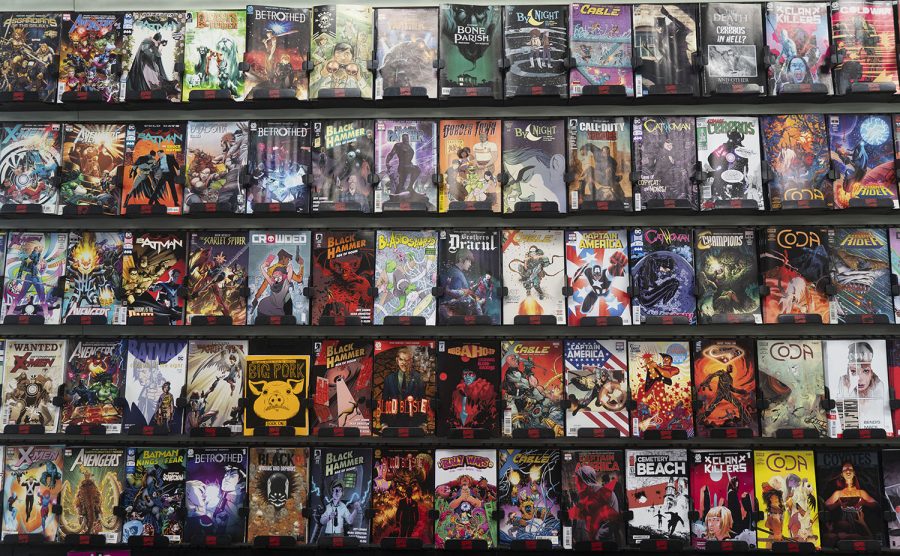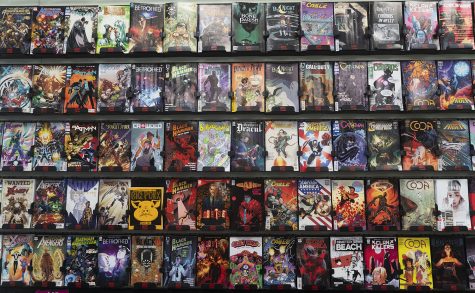Yerington: Comic books are sophisticated literature
Comic book lovers have always been told “Comics are for kids”, but that argument is flawed and needs to be put to rest.
A collection of comic books is seen in Daydream Comics on Tuesday, Sept. 18, 2018.
November 26, 2018
As a longtime comic book reader, I was always faced with the consistent remarks of, “comics are for kids,” or “comics are for those who can’t read ‘REAL’ books.” These negative comments hurt my self-esteem growing up because I loved these stories and the art form that is the comic/graphic novel narrative. As I grew older, something great happened: Nerd culture became widely popular, and for good reason.
Still, the argument that comics are something that should never be regarded as anything but “childish” persists. Recently, Bill Maher wrote a blog post after Marvel Comics legend Stan Lee died. On Maher’s website, he wrote a blog called “Adulting” and said that as a nation, we should have grown out of these books. Maher said fans of comics “pretended comic books were actually sophisticated literature.”
RELATED: Smith: The Black Super Hero
I strongly oppose Maher’s opinion. To me, comics have without a question always been a sophisticated form of literature.
I spoke with University of Iowa Associate Professor Corey Creekmur, the writer of Science Fiction and Comics and essays such as “Under Pressure (about ‘Breaking Bad’),” on this argument of comics being a sophisticated way to tell stories.
When asked what are some of the qualities that comics as a form of literature have that others forms of literature lack, Creekmur responded, “While all books require some negotiation between language and image (if only in matters of layout, typography, etc.), comics typically demand the simultaneous interaction of both media. The best comics (many believe) make full use of both text and image to convey meaning — they do not function as merely illustrated books, which could function without images.” Comics are not only a way of expressing narrative storytelling, they also meld both visual storytelling with it to express something that other literature cannot.
RELATED: Daydreams Comics owner not worried about DC online streaming threat
With comics having such a demanding and hard job to accomplish for readers, why do people dismiss comics as simply “childish” and not “real” literature? When asked a similar question, Creekmur responded, “This is a historical phenomenon, and the general assumption that comics are for children only arises most fully after [World War II] with the rise of the self-censoring Comics Code, which sought to make comics ‘safe’ for children. Prior to then, many adults read comics, and comics have never been exclusively associated with children in other parts of the world, such as Europe or Japan.”
So why is it that comics as a form of literature are always attacked by people deeming them as “childish”? Why would people attack this form of literature? Why would people such as Bill Maher say, “A culture that thinks that comic books and comic book movies are profound meditations on the human condition is a dumb f**king culture.” Creekmur responded that people have that opinion, “Because they haven’t actually read them, and are only aware of comics as a source for superhero movies THEY consider trivial.”
Comics are quickly dismissed as simply stories of superheroes fighting evil, but there are countless graphic novels about other subject matters. The 1992 Pulitzer-prize winning graphic novel MAUS by Art Spiegelman is an allegorical tale about Nazi Germany with animals in place of Jews and Nazis. Another novel that deals with superheroes but in a much darker light is Alan Moore’s Watchmen. This 12-issue story shows a parallel universe much like our own, but with heroes that helped during all the U.S. wars. This novel shows Cold War conflicts and deep dives into the human experience if one had a superhero’s power.
The list of comics that focus on the human condition is substantial. For people to simply dismiss a whole form of art and literature as “dumb” and “trivial” shows they clearly do not understand the importance of comic books.




















